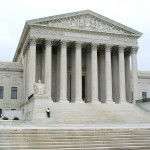 The U.S. Supreme Court recently began its October 2012 term. While issues like affirmative action, gay marriage, and voting rights are some of the most-highly anticipated issues on the docket this term, it is sometimes the lesser-known cases that really make waves.
The U.S. Supreme Court recently began its October 2012 term. While issues like affirmative action, gay marriage, and voting rights are some of the most-highly anticipated issues on the docket this term, it is sometimes the lesser-known cases that really make waves.
As New Jersey public law attorneys, we are closely watching several cases that will come before the Supreme Court this term. Below is a brief preview of the issues involved:
Koontz v. St Johns River Water Management: The Supreme Court will consider the circumstances under which the refusal to issue a permit can constitute a taking. The specific question before the Court is whether the government can be held liable for a taking when it refuses to issue a land-use permit on the sole basis that the permit applicant refused to agree to a permit condition that, if applied, would violate the essential nexus and rough proportionality tests set out in Nollan u. California Coastal Commission, 483 U.S. 825 (1987), and Dolan v. City of Tigard, 512 U.S. 374 (1994). The Court will also determine whether the tests apply to a land-use exaction that takes the form of a government demand that a permit applicant dedicate money, services, labor, or any other type of personal property to a public use.
McBurney v. Young: The Supreme Court will consider whether a state may preclude citizens of other states from enjoying the same right of access to public records that the state affords its own citizens. The petitioner claims that prohibiting non-citizens from obtaining public records under a state’s open-records law is unconstitutional in that it violates both the Privileges and Immunities Clause and the Commerce Clause. The circuits are currently split on this issue.
City of Arlington v. FCC: The Supreme Court will consider whether a court should apply the precedent established in Chevron U. S.A. Inc. v. NRDC, Inc., 467 U.S. 837 (1984) in the context of an agency’s determination of its own statutory jurisdiction. Chevron holds that courts must defer a federal agency’s reasonable interpretation of an ambiguous statute that the agency is charged with administering. The case involves the Federal Communication Commission’s authority to establish specific deadlines for cities to act on wireless-tower zoning requests under the 1996 Telecommunications Act.
To find out more about the public law cases discussed in this blog, please contact a member of Scarinci Hollenbeck’s Public Law Group. For additional information about the upcoming Supreme Court term, we invite you to check out the Scarinci Constitutional Law Blog.
